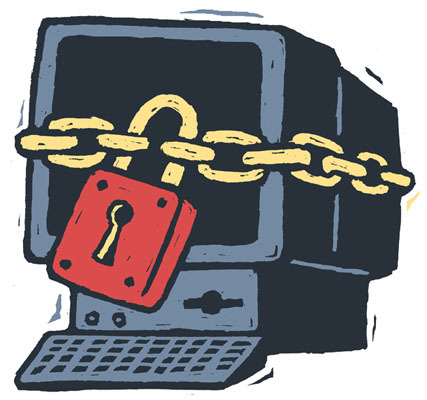The world is little less safe than it used to be. Be it in real world or the cyber world. There are daily news reports about various crimes that are taking place in the world around us. The crime rates are increasing too. I had come across an article on a newspaper regarding the crimes of a different sort, the crimes of the cyber world! So I thought of sharing something about it, so that may make you a little extra careful and be safe.
The classic definition of cyber crime says that:
Computer crime refers to any crime that involves a computer and a network. The computer may have been used in the commission of a crime, or it may be the target.
Two main categories:
(1) Crimes that target computers directly.
Ex: Viruses, malicious code.
(2) Crimes facilitated by computer networks or devices, the primary target of which is independent of the network or device.
Ex: Cyber stalking, Phishing scams.
Types of cyber-crimes:
1) Hacking:
Means unauthorized attempts to bypass the security mechanisms of an information system or network.
2) Denial of service attack (Email bombing):
This is an act by the criminal, who floods the bandwidth of the victim’s network or fills his email box with spam mails depriving him of the services he is entitled to access or provide.
3) Software theft (Software piracy):
Theft of software through illegal copying of genuine programs.
4) Pornography:
It is the first consistently successful e-commerce product. There are more than 420 million pornographic websites running today.
5) Credit card fraud:
Credit card information is stolen by hacker during online transaction.
6) Cyber extortion:
Copying the company’s confidential data in order to extort said company for huge amount.
7) Phishing:
It is technique of pulling out confidential information from the bank or financial institution account holder by deceptive means.
8) Email spooling:
Refers to email that appears to have been originated from one source when it was actually sent from another one.
9) Cyber stalking:
The criminal follows the victim by sending emails, entering the chat rooms may be frequently.
10) Cyber defamation:
The criminal sends emails containing defamatory matter to all concerned of the victim or post the defamatory matter on a website.
Steps to avoid becoming victim of cyber crime:

1) Education:
Hackers aren’t the only ones who can gain power from information. By educating yourself about the types of scams that exist on the Internet and how to avert them, you are putting yourself one step ahead of the cyber criminals.
2) Use a firewall:
Firewalls monitor traffic between your computer or network and the Internet. Use firewall for your systems.
3) Click with caution:
When you’re checking your email or chatting over instant messenger (IM), be careful not to click on any links in messages from people you don’t know. The link could take you to a fake Website that asks for your private information, such as user names and passwords, or it could download Mal-ware onto your computer.
4) Practice safe surfing:
When you are on the internet you need to take precautions to avoid fake Websites that ask for your personal information and pages that contain Mal-ware.
5) Practice safe shopping:
Be careful when you shop online in case of payment information.
6) Use of antivirus:
Keep updating your system antivirus to prevent illegal entry into your system.
7) Secure your wireless network:
You can keep the hackers out by enabling the firewall on your router and changing the router’s administrator password. Cyber criminals often know the default passwords and they can use them to hack into your network.
8) Use strong passwords:
Strong passwords can go a long way in helping secure your information, so choose a password that is at least 10 characters long and consists of a combination of letters, numbers and special characters.
9) Use common sense:
Use common sense whenever you’re on the Internet. Never post personal information online or share sensitive information such as your social security number and credit card number.
10) Be suspicious:
Backup your data regularly in case anything goes wrong, and monitor your accounts and credit reports to make sure that a hacker has not stolen your information or identity.
According to the report, the number of cases that were registered under the nation’s IT act in 2011 were 1,791 – a considerable rise of 85.4 percent from the 966 cases registered in 2010.
References:
http://en.wikipedia.org/wiki/Computer_crime
http://www.ehow.com/how_4967690_prevent-cyber-crime.html
http://www.rbs2.com/cvict.htm

